Will Ankan and Abantika get justice?

"It's not suicide, it's murder. Technically murder," declared Fairuz Abantika, a student from the 13th batch of Jagannath University's (JnU) law department, as she tragically ended her life, leaving a haunting note on Facebook. In her note, she pointed fingers at a classmate and the university's assistant proctor for her demise. But the death of Ankan Biswas, a student from the 12th batch of JnU's English department who passed away in 2022, is still shrouded in mystery; whether it was suicide or murder remains unknown.
Abantika's mother took legal action, filing a case of abetment to the suicide of her daughter. Subsequently, the accused were apprehended. However, the question of responsibility for Ankan Biswas' death remains unanswered. Ankan, who excelled academically and showcased talents in debating and dancing, fought for her life in the ICU for nearly two weeks before succumbing to death. Suspicion fell upon Ankan's husband Shakeel, a fellow student at the same university, whom she'd married in secret just months before her passing. Police initiated a case of wrongful death, marked by the hospital's stamp on her admission slip indicating "Police Case." Despite her classmates' pleas, Ankan's family declined to pursue any legal action.
Following Abantika's passing, numerous individuals have come forward to share their experiences of facing sexual harassment within JnU. Kazi Farzana Mim, student at the film and television department, disclosed that both her academic pursuits and personal life were affected by significant threats after she refused an inappropriate proposition from a teacher. Consequently, she allegedly received unfair grades in the subject taught by that teacher. Prof Sadeka Halim, vice-chancellor of JnU, revealed during a media interaction on Monday that she was involved as an external member of the anti-sexual harassment committee in Farzana Mim's case. However, she noted that the committee's report on the case was not considered. She intends to address the issue with the chairperson of Mim's department, seeking clarification regarding her failing grade in the chairperson's subject as well.
Abantika's tragic demise has brought Mim's plight back to the surface, raising hopes for eventual justice, albeit delayed. But what about Ankan Biswas? Will she ever get justice? JnU students have once again raised their voices demanding justice for Ankan. While the university administration promptly responded to Abantika's case, amid the ongoing protest, it would establish a remarkable precedent if it courageously pursued legal proceedings to unveil the truth behind Ankan Biswas' death as well, and also other incidents unreported due to fear. The committees formed to look into such reports often try to process the cases hastily and gloss over them.
From the recent events at JnU, one thing is clear: seeking justice here often leads to further harassment. Mim reported filing her complaint on December 26, 2021, and by February 2022, she found herself alone, holding a placard, demanding justice on the university's Shaheed Minar premises. Subsequently, an inquiry committee was formed, but it has yet to produce an official report. Mim said that even after two years, she is still facing harassment. A similar pattern is present in Abantika's case as well.
Should the JnU administration succeed in instilling confidence among students about getting justice, perhaps tragedies like Abantika's death could be prevented, and numerous students like Mim could complete their education without obstacles. I am acquainted with a few students who would come forward with their grievances if they were guaranteed fair treatment from the administration. Encouraging students to lodge such complaints would empower them to approach the administration without fear of further harassment.
The tragic passing of Abantika has reignited the drive to seek justice for Ankan, Mim, and numerous others. However, the cost of seeking justice is also exceedingly burdensome. In all this, we must confront one question: is it unreasonable to seek justice from a university administration before a student reaches the point of contemplating suicide?
As I experienced during my student life at JnU, students often refrain from disclosing incidents of harassment to their families. This reluctance stems from the fear that instead of offering support, some families may stop their education. While people's lack of trust in the justice system plays a role, it's not the sole factor. Certain families, influenced by conservative beliefs, may discourage their children from pursuing justice and prefer they avoid the struggle. Moreover, societal norms of patriarchal dominance hinder female students' access to justice. This attitude of patriarchal superiority is conspicuous in cases like Abantika's, and particularly evident in social media commentary.
With the ongoing commercialisation of university education, the dynamics between students and teachers have shifted towards one resembling that of "master" and "servant." Students often feel compelled to maintain favourable relations with teachers through a subservient attitude, seeking their favour in matters such as class attendance, exam results, and assignments. If a teacher retaliates against a student for any reason, it could jeopardise the student's entire university experience, leading to prolonged mental distress. While there is a psychiatric service centre on campus to address students' mental health concerns, it is equally crucial to provide mental health care for teachers who view students as mere subordinates. However, addressing this mentality solely within the university structure may prove challenging.
Universities must establish anti-sexual harassment cells, as mandated by a directive issued by the High Court in 2009. It is crucial to ensure that students are informed about the channels available for lodging complaints if they experience any form of harassment or oppression within the university. Regular awareness campaigns should be organised to empower victimised students to approach relevant authorities without fear or hesitation. The recent implementation of such awareness programmes at JnU sets a positive example, and all educational institutions must follow suit by undertaking similar initiatives.
The tragic passing of Abantika has reignited the drive to seek justice for Ankan, Mim, and numerous others. However, the cost of seeking justice is also exceedingly burdensome. In all this, we must confront one question: is it unreasonable to seek justice from a university administration before a student reaches the point of contemplating suicide?
Lucky Akter is member of the Central Committee of the Communist Party of Bangladesh (CPB), and a former student of Jagannath University (JnU).
Views expressed in this article are the author's own.
Follow The Daily Star Opinion on Facebook for the latest opinions, commentaries and analyses by experts and professionals. To contribute your article or letter to The Daily Star Opinion, see our guidelines for submission.

 For all latest news, follow The Daily Star's Google News channel.
For all latest news, follow The Daily Star's Google News channel. 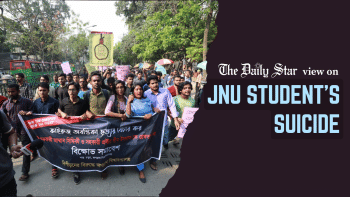
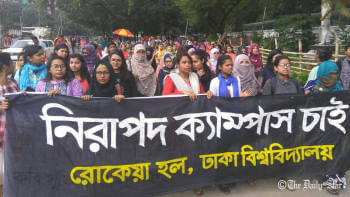
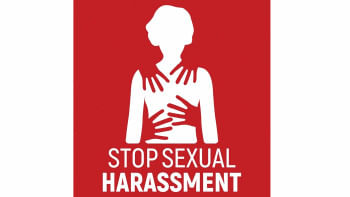


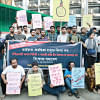
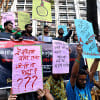





Comments